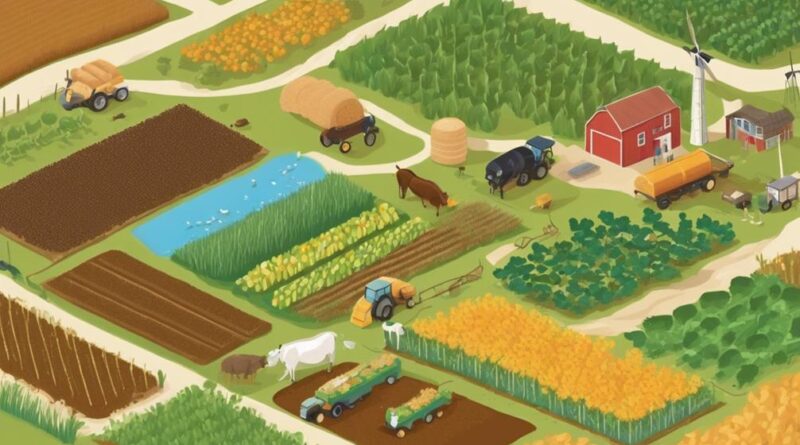3 Best Ways Farming Sustainably Impacts the Environment
Reducing carbon footprint through sustainable farming is crucial. Conservation tillage, crop rotation, and cover cropping help minimize emissions. Biodiversity conservation is another essential aspect. By preserving habitats and planting diverse crops, ecosystems thrive. Soil health improvements are significant too. Techniques like crop rotation and cover cropping prevent erosion, boost fertility, and reduce the need for fertilizers. Sustainable farming ensures increased yields and less environmental harm, making a lasting impact. The benefits of sustainable farming practices on the environment are extensive, highlighting the vital role agriculture plays in ensuring a healthier planet.
Reduced Carbon Footprint
By implementing sustainable farming practices, farmers can significantly decrease their carbon footprint, contributing to a healthier environment. Carbon offsetting is a key strategy in emission reduction within the agricultural sector. Sustainable farming methods such as conservation tillage, crop rotation, and cover cropping play a crucial role in sequestering carbon from the atmosphere. Conservation tillage, for example, reduces soil disturbance, which helps maintain soil organic matter and reduces carbon dioxide emissions.
Additionally, crop rotation helps improve soil health, leading to increased carbon sequestration. By alternating crops seasonally, farmers can prevent soil degradation and enhance its ability to store carbon. Cover cropping, where plants are grown during off-seasons to protect and enrich the soil, also aids in carbon sequestration. These practices not only reduce emissions but actively remove carbon dioxide from the atmosphere.
Studies have shown that sustainable farming practices can lead to a substantial decrease in greenhouse gas emissions. For instance, a research study conducted by the Food and Agriculture Organization (FAO) found that implementing conservation agriculture practices could potentially reduce emissions by up to 302 million tons of carbon dioxide equivalents per year globally. By adopting sustainable farming methods, farmers can make a significant impact in mitigating climate change and promoting a more sustainable future.
Biodiversity Conservation
Biodiversity conservation in sustainable farming practices enhances ecosystem resilience and promotes long-term environmental stability. By preserving habitats within agricultural landscapes, farmers play a crucial role in maintaining the balance of ecosystems. Habitat preservation allows for the protection of various plant and animal species, preventing biodiversity loss and ensuring the health of local ecosystems.
Efforts to conserve biodiversity on farms can positively impact ecosystem balance. For instance, planting diverse crops helps support a variety of pollinators and beneficial insects, which in turn contribute to natural pest control and pollination. This reduces the need for synthetic pesticides and fertilizers, further enhancing the overall health of the ecosystem. Additionally, maintaining natural habitats such as hedgerows, wetlands, and forests within or around farms provides essential shelter and food sources for wildlife, contributing to the overall richness of biodiversity in the area.
Research indicates that biodiversity conservation in agriculture leads to increased soil health, water quality, and resilience to environmental changes. By implementing sustainable farming practices that prioritize habitat preservation and ecosystem balance, farmers can't only protect the environment but also ensure the long-term productivity and viability of their operations.
Soil Health Improvement
Enhancing soil health is a fundamental aspect of sustainable farming practices that directly impacts agricultural productivity and environmental quality. By implementing techniques such as crop rotation and cover crops, farmers can significantly improve soil health, leading to increased yields and reduced environmental impact.
- Crop Rotation: Rotating crops seasonally helps prevent soil erosion, reduces pest and weed pressure, and enhances soil fertility by varying nutrient demands.
- Cover Crops: Planting cover crops during off-seasons protects the soil from erosion, improves water infiltration and retention, suppresses weeds naturally, and adds organic matter to the soil.
Implementing these practices not only benefits the soil but also has far-reaching positive effects on the environment. Healthier soils store more carbon, contributing to climate change mitigation, while also reducing the need for synthetic fertilizers that can pollute waterways. Moreover, improved soil structure resulting from these practices enhances biodiversity in the soil, promoting the growth of beneficial microorganisms and earthworms that further enhance soil fertility.
Conclusion
In conclusion, sustainable farming practices have a significant positive impact on the environment. By reducing carbon emissions, conserving biodiversity, and improving soil health, farmers can play a crucial role in mitigating climate change and promoting ecological balance.
The data clearly shows that adopting sustainable farming methods not only benefits the environment but also contributes to long-term agricultural productivity and resilience. It's imperative for farmers to continue implementing these practices to ensure a healthier planet for future generations.
